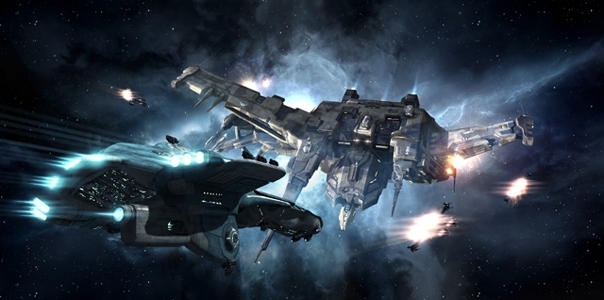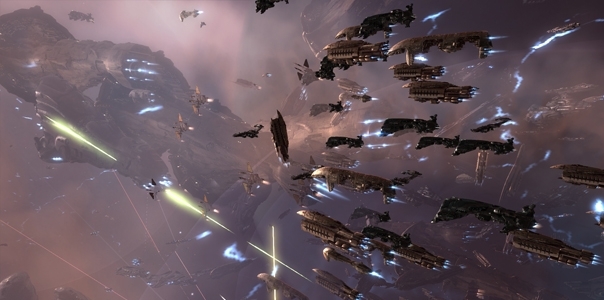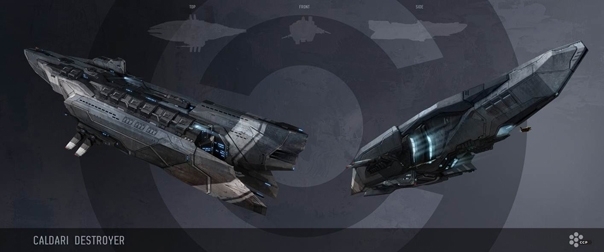Interview: Caretakers of a Universe
EVE Online Executive Producer Jon Lander talks about perfecting a galaxy-sized sandbox, maintaining that unforgiving feel, and building new windows on their sci-fi world.

Not many MMOs have been as successful as EVE Online, with the number of registered capsuleers growing every year since launch. Nine years and seventeen free content updates later, CCP’s spacefaring universe is as popular as ever. With Retribution -- the game’s 18th update -- and free to play shooter Dust 514 due out later this year, the Icelandic developer shows no signs of slowing down.
For Jon Lander, executive producer for EVE Online, part of that success is because his team view themselves as caretakers, and that the game CCP has built over the years actually belongs to the players that inhabit it. It’s a unique viewpoint that emerged as we spoke at the Eurogamer Expo last month, a focus on being respectful of the legacy inside the sandbox MMO, while being bold in improving and expanding it.
In a wide-ranging interview, Lander shared his opinions on kick starting player created content, and why rebuilding core game mechanics doesn’t make EVE a safer place. He also revealed how CCP is extending their sandbox out of the game through the introduction of CREST, the new read/write API available to third-party developers. But, with the development studio based in the unlikeliest of places, Lander shared some insight into the culture that gave birth to this incredible world, and what lessons other MMOs can learn from it.
Unintended Consequence, Unexpected Boons
Next year, EVE Online celebrates its tenth anniversary. While the veteran MMO has continued to evolve and expand from those early days, it also has a number of mechanics that have built up over time. With the old and complex aggression mechanic being replaced by a more straightforward system named Crimewatch, I asked Lander how nervous he was about changing systems that had been in-game for some time. “No more than normal. This is one of the interesting challenges you have when you’re looking after a ten year old game. There are not that many games around which are still running on effectively the same code, and it’s just a fact of life that, with any complex system that grows, you need to go back and revisit things and refactor them.”
“When you have a game that’s complex as EVE, with so many intertwining bits and pieces, touching any one of them can have unintended consequences. But we’re used to it by now – we put out a release and then we are watching very, very closely for weeks afterwards”
That law of unintended consequences also extends to the player base, with Lander’s team eager to find out how new tools are being used and what forms of gameplay emerge. “We don’t want to be in the game of creating all the content for our players, saying ‘here you go, here’s the next expansion with five hundred new missions’, because someone will go and do those 500 new missions in a week, and then they’ll be bored. So it’s about ‘here are some tools, what are you going to do with them?’”

Lander then went on to give some examples, explaining that things don’t always go according to plan. “We saw after the Inferno release where, when you destroy a ship, we calculate its value, and you get a proportion of faction warfare loyalty points for it, based on the value of the components on it. So of course, some of our clever players found some items on the market which never get bought or sold, and are 1 ISK (Interstellar Kredits, EVE’s in-game currency). They bought them all for 1 ISK, put them back on the market for a billion ISK each, and then bought them to artificially raise the price. They could then blow their own ships up with these modules in and get huge amounts of loyalty points.”
“That’s actually an exploit, that’s something which could destabilize our economy and it’s obviously not proper gameplay, so we fixed it. But it just goes to show, you never know what’s going to happen with these changes. So we just need to watch very carefully.” Despite the potential downside, Lander remains adamant that regular refinements and improvements are the way ahead. “It’s one of the risks you have to take, it’s just one of those things you have to do, otherwise you would end up not putting anything out for fear of something bad happening. As long as you’re quick and agile about fixing these things it’s not a problem.”
Unintended consequences can also be hugely beneficial to the game, with Lander explaining how jet can mining emerged. “Way, way back in 2003, the original creators of the game had these huge spreadsheets about how much ore you would get when you mined. Then they would compare that to the cargo holds of frigates, and they’d work it out so you’d spend a certain amount of time before you have to go back to the station to drop your ore off. Until somebody realized “Oh, I can just right click on the ore in my cargo hold and jettison it, and when I jettison it there’s this can, which is of almost infinite volume, so I can keep mining and drop it into that can for ages. That enabled them to have a buddy who would team up and haul that can, going backward and forward to the station while the other guy mined.”
“Originally that was a bug, but it’s having the desired effect of making people work together and creating these social bonds.” Other forms of gameplay also started to emerge, such as can stealing and flipping (replacing a miner’s can with your own to provoke a hostile action). Lander continued that wherever possible, the team tries to embrace these unexpected behaviors.
Besides encouraging player-created content, I was curious to understand if the sandbox and systems-led approach provided other benefits, such as shorter beta testing or more regular updates. “I think the sandbox element means that we can tweak things and have a major impact.” Lander went on to explain that some of the features take a long time to implement, and so get put on a longer path. He also added that at the beginning of the year, mini releases were coming out about once a month, with development teams leapfrogging each other as they finished new ships or addressed balance issues.
Creating new toys is great, but Lander was eager to stress that players need some new content. “We are in the business of giving tools to our players in the sandbox – it gives us a lot of flexibility. But you can’t just give tools; you’ve got to put something new out there. In Retribution we’re putting out five new ships and rebalancing 40.” It makes sense, considering how EVE is a game about spaceships and the people that fly them, and part of that is ensuring that there are always interesting new ships to obtain. He added that “it’s a real balancing act between refactoring some gnarly underlying old systems, putting some new things out and creating some tools.”

The Unforgiving Constant
When other MMOs have decided to simplify systems or become more accessible to new players, it’s sometimes resulted in a ‘dumbing down’, with the game losing some of the depth that veterans cherished. I asked Lander how he planned to balance the two, and he responded by explaining how the two don’t have to be linked. “One is about a deep, complex, unforgiving game. Someone likened EVE as being the MMO version of Dark Souls – it punishes you when you do things wrong, but because of that, when things go right, you work together you achieve something that remains persistent and gives you a great feeling. I don’t think we ever want to change that side of things, that sort of depth, danger, darkness. But some things are just sadistic. Some things are just poorly implemented, or rushed, or overly complex for no real gain. Something being difficult to understand is very different from being a hardcore game, and we need to be very clear about that too.”
He then went on to explain how Crimewatch fits in with that approach. “We’re enabling people not to accidentally get themselves blown up in High Sec. So if you don’t want to accidentally fire on that Stargate, because you accidentally misclicked or whatever, you’ve got that safety catch and won’t die. That’s very different from saying we will not allow anybody to shoot you in High Sec. That would be a dumbing down and a simplification, and a step back from where we are. So we’re not doing that, we’re just saying “We’re going to help you not to do stupid things, but if somebody wants to get that safety catch off, and wants to go and suicide gank somebody in High Sec, go for it.”
While replacing or refactoring a mechanic is sometimes the best approach, Lander explained that it wasn’t always possible to do this directly. “I think anybody who’s had to manage a corporation in EVE curses the Corporation Management Interface. I’ve done it many, many times. We spoke to the CSM (Council of Stellar Management), and they said ‘For God’s sake, please change it’. And I went ‘OK, I feel your pain. How?’ And they came up with eight different ways of doing it, because they all use it in eight different ways. So sometimes the complexity allows people to do unique things.”
The solution in this instance was to use CREST, the new read/write API that third party developers will be able to use to develop their own interfaces outside of the game. While the team is starting off with chat, it’s likely that Corporation Management will quickly follow, allowing players to manage their corporations however they want. “One of the things we want to do with CREST is breathe more life into that third party developer community, because sometimes we shouldn’t make players suffer that kind of stuff.”
EVE Online: Retribution also includes updates to the NPC AI. In a game focusing on spaceships, systems and social interactions, is a PvE update needed? “One of the things we’ve got to be very cognizant of, is that while PvP, Alliances, Low Sec, and factional warfare are fundamental parts of where EVE is, there is a large number of people who do PVE content. And one of things we haven’t done in a long time is invest a huge amount of effort into it. We did Incursions a while back, which were group PvE, and I think there’s a good mix in the Apocrypha expansion, but we’re going back quite a way now.”
While there’s been a reasonable amount of PvE content in factional warfare, Lander feels that the shine has worn off. “You can Google how to do a Level 4 mission. That sense of wonder, that sense of uncertainty, that sense of excitement that you get has been replaced.” By selecting certain ships and training in certain skills, it’s possible to start a mission then just leave the keyboard. Lander explained that the changes shouldn’t make the missions harder, just that players will have to pay attention.
“If you want to go in, drop your drones and go to sleep for half an hour, then your drones are going to get picked off and you’re not going to achieve anything. You have to be engaged and you have to think a little. So I think it’ll be interesting – I don’t see it as a panacea for all the ills of PvE, but I think it’s a stepping stone in the right direction. If you look at some of the open world questing that Guild Wars 2 does really well, we’ve had some ideas in that kind of thing for a while now, which we’re sort of developing and trying to get right.”
Next Up: Integrating Dust 514 and EVE's Social Legacy on Page 2 ->




